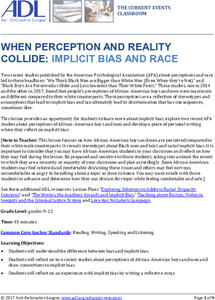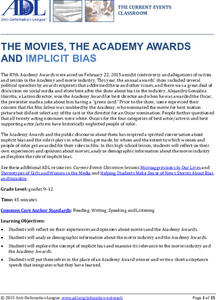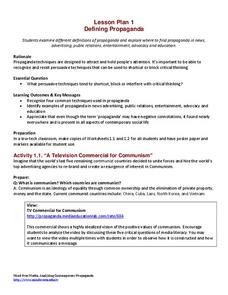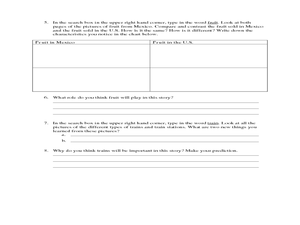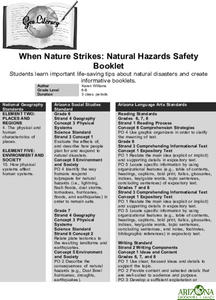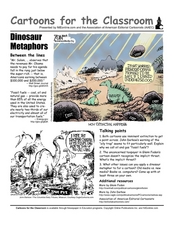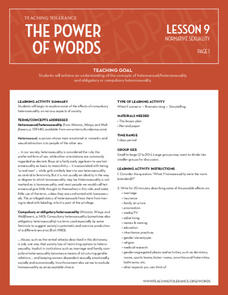Anti-Defamation League
Implicit Bias
Everyone has biases, both explicit—ones we are aware of—and implicit—ones we are unaware of. High schoolers learn the differences between explicit and implicit bias in a short lesson where pupils watch a short video, read articles about...
PBS
Explicit and Implicit Language – Interpreting the Meaning of the Fourteenth Amendment
How do Supreme Court justices interpret amendments to the Constitution? The resource helps answer that question by discussing how people use explicit and implicit language to interpret the meaning of the Fourteenth Amendment. Learners...
Anti-Defamation League
When Perception and Reality Collide: Implicit Bias and Race
The big idea in this lesson plan is that implicit bias often clouds perceptions. High schoolers watch a short video, read research articles, and engage in discussions about implicit bias and how these biases lead to stereotyping. They...
PBS
Who, Me? Biased?: Understanding Implicit Bias
A 10-page interactive explains different facets of implicit bias, demonstrates how implicit bias works, and how people can counteract its effects. The interactive tools permit users to save their information in "My Work" folders, to take...
PBS
Ken Burns: Jackie Robinson - A Journey Back to Separate but Equal Conditions
Baseball great Jackie Robinson fought for social justice. His efforts to push for equal access are detailed in an episode from from the Ken Burns: The Jackie Robinson Collection. After viewing the clip, class members engage in a...
Curated OER
Explicit and Implicit Language - Interpreting the Meaning of the Fourteenth Amendment
Young scholars write an essay analyzing the language of the Fourteenth Amendment to the US Constitution. In this US History lesson, students review the difference between implicit and explicit meanings. Young scholars watch a...
Federal Reserve Bank
The Legacy of the Olympics: Economic Burden or Boon?
Do the economic benefits of major sporting events such as the Olympics or the World Cup outweigh the expected costs? Using fundamental economic terms, discover the explicit and implicit costs and benefits for countries that host these...
Curated OER
Implicit Effects
Third graders describe cause and effect. In this implicit effects lesson students name the implicit effects in the story Two Ways to Count to Ten: A Liberian Folk Tale by Ruby Dee. Students analyze the story to find details to support...
Anti-Defamation League
The Movies, the Academy Awards and Implicit Bias
"And the award goes to. . . " High schoolers investigate bias in the movie industry by reading articles, watching a short video, and examining data about the Academy of Motion Picture Arts and Sciences (AMPAS) membership, nominees, and...
Anti-Defamation League
Women’s Inequity in Pay: Could It Be Sexism, Implicit Bias or Both?
Equal pay for equal work? High schoolers research the reasons for the inequity in women's pay. They read articles, examine graphs, engage in discussion, and then craft an essay in which they suggest a way to address the gender wage gap.
National History Day
Propaganda Posters of World War I: Analyzing the Methods Behind the Images
The power of a picture. During the events surrounding World War I, propaganda posters were widely distributed in American society to sway the emotions of its citizens. By analyzing World War I propaganda posters in the first installment...
Curated OER
Lesson 4: Fact and Opinion - Rosa Parks: My Story
Sixth graders examine implicit and explicit opinions in a text about Rosa Parks. In this explicit and implicit opinions lesson plan, 6th graders participate in direct teaching, guided practice, and independent practice while reading an...
Mikva Challenge
Deconstructing Campaign Messages and Perceptions
Target audience, covert message, explicit and implicit appeals. As part of an investigation of rhetorical devices used in campaign ads, class members examine and deconstruct the appeals in logos from...
Media Education Lab
Defining Propaganda
21st century learners live in a media world. Help them develop the skills they need to be able to analyze the barrage of propaganda they face daily, with a resource that introduces them to the type of persuasive appeals found in...
Curated OER
Cultural Values Messages in the Giant Kites of Guatemala
Pupils describes ways in which the arts serve as expressions of culture. They explain how some forms of cultural communication contributes to societal cohesion and/or division. Students detect and analyze explicit and implicit messages...
Facing History and Ourselves
Confirmation and Other Biases
As the investigation into the reporting of the events in Ferguson, Missouri, continues, class members consider how bias influences perception, how the tendency is to collect evidence that supports preconceived notions. The big idea...
National Endowment for the Humanities
Cultural Change
High schoolers research the passage of the 19th Amendment as an illustration of the mutual influence between political ideas and cultural attitudes. They also read the Seneca Falls Declaration and explore the cultural shifts it both...
Curated OER
Esperanza Rising - Anticipation Guide
Learn about Mexican culture while simultaneously strengthening reading, writing and computer skills. In order to get the most out of Esperanza Rising, pupils should have prior knowledge of Mexican culture. Therefore, there are links to a...
Curated OER
When Nature Strikes: Natural Hazards Safety
Students observe the impact of natural disasters on humans, and become aware of the dangers of environmental hazards such as flash floods, tornadoes, and hurricanes.
Curated OER
Creating Classroom Rules
Why do we even have rules? Youngsters need to fully understand the answer to this question in order to be on their best behavior. First they examine how they help people get along in a group and keep people safe. They create personal...
Novelinks
Man's Search for Meaning: ReQuest Procedure Questioning Strategy
As part of a study of Viktor Frankl's Man's Search for Meaning, class members respond to, and craft, higher-level comprehension questions based on passages from the text.
Facing History and Ourselves
The Nazis in Power: Propaganda and Conformity
The Nazis used the power of propaganda to encourage confirmative views and the discrimination of Jews. A social studies resource illustrates these issues through discussion, image analysis, and a writing exercise.
Curated OER
Fossil Fuels and the Debt Crisis: Political Cartoons
Wondering what dinosaurs have to do with the debt crisis? This analysis handout includes two political cartoons using dinosaur metaphors, and prompts pupils to consider the symbolism to understand the cartoonist's point. You may want to...
Teaching Tolerance
The Power of Words: Normative Sexuality
High schoolers collect newspaper articles which discuss societies who enforce heterosexuality. They brainstorm how heterosexuality is enforced in their community. They answer questions to end the instructional activity.
Other popular searches
- Elementary Implicit
- Implicit Differentiation
- Implicit and Explicit Meaning
- Implicit Questioning
- Teaching Inference Implicit
- Implicit Explicit
- Implicit Main Idea
- Implicit and Explicit Facts
- Implicit Differentation
- Implicit and Explicit
- Implicit Functions
- Implicit Ideas


